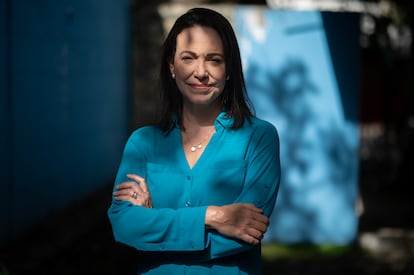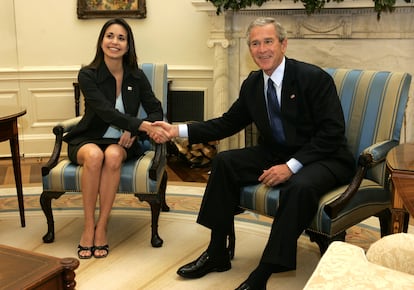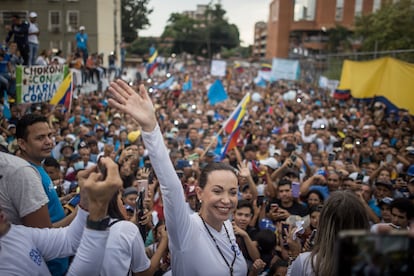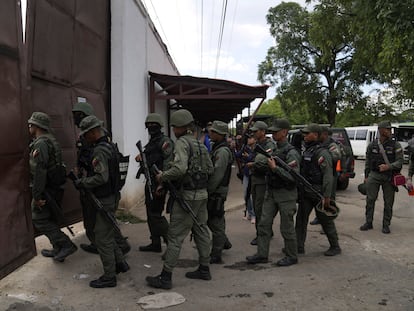María Corina Machado, the Venezuelan Margaret Thatcher
The politician — who currently leads the opposition primary polls in Venezuela — defends privatization policies and the reduction of the size of the state. However, she’s tolerant and flexible on issues such as abortion and gay marriage

There are some politicians who, the moment they burst onto the scene, become central characters from one day to the next.
The examples have piled up in recent years: Donald Trump, Jair Bolsonaro, Nayib Bukele and Javier Milei. These figures — who emerged out of the blue — managed to connect with populations who were fed up with the status quo. They saw a last chance in these so-called “outsiders.”
Something like this is happening in Venezuela with María Corina Machado, who is the undisputed poll leader in the opposition primaries, which will take place on October 22. However, the difference is that Machado isn’t an outsider, nor a newcomer to politics. She isn’t part of the group of leaders from the disruptive extreme-right, nor does she represent charismatic populism.
Machado has spent over two decades in politics, clinging to her convictions. Considered the representative of the radical wing of the opposition, former socialist president Hugo Chávez — who governed from 1999 until his death in 2013 — derided her as “the good-looking bourgeoisie.” Others refer to her as “the iron lady,” in reference to Margaret Thatcher. Now that her political moment has arrived, many are wondering: what is María Corina Machado’s ideology?
Machado defines herself — and her party, Vente Venezuela — as “liberal” (or neoliberal, depending on how you look at it), both politically and economically. Her political vision revolves around reducing the size of the state as a provider of public policies, supporting entrepreneurship and promoting the free market, as a means of creating wealth and jobs in a devastated economy. Her vision of government is similar to what Margaret Thatcher or Ronald Reagan had in mind. In Latin America, her proposals seem to align with former Chilean president Sebastián Piñera, of the center-right, who served two terms (2010-2014, 2018-2022). “Margaret Thatcher had the courage to defend her values all her life against everyone who opposed her,” Machado tweeted in 2013, perhaps alluding to herself. She spent a decade after Thatcher’s death navigating the Chavista regime — which has been led by Nicolás Maduro following his predecessor’s death — and the opposition itself. Only now has she gained a big following.

This 55-year-old industrial engineer — divorced and the mother of three children, who have grown up far away from the country for their safety — has never gotten along with the left in Venezuela. For a long time, the bulk of her support came from the upper class — which is the class that her family has always belonged to — and from Venezuelans in the diaspora. But, in recent months, the former congresswoman has broken her own glass ceiling.
Thousands of people show up to see her every day, no matter where she’s touring in the country. The rich and the poor come to her rallies, even in the traditional strongholds of Chavismo. Disenchantment with the government — and with the largest opposition parties — has grown as the population contends with a humanitarian crisis. This has bolstered Machado, a woman with clearly-defined ideas, who is seeking to completely turn around her country’s crumbling economy. At the same time, as millions have fled Venezuela, she has managed to connect with the pain of so many broken families. She is also a mother who misses her children.
Machado has always avoided labels. “If proposing that the eradication of poverty is the responsibility of the entire society is a left-wing idea, then I’m left-wing. If believing in personal freedom, in investment, in productivity is a right-wing position, then I’m right-wing,” she said in 2012. The politician maintains a tolerant and flexible stance on issues such as abortion — she advocates that her country decriminalize it, at least in cases of rape — gay marriage, and the use of medical marijuana. While Machado acknowledges that she believes in God, she rules out the idea of her faith creeping into her politics.
The presidential candidate has proposed privatizing the state-owned oil company, Petróleos de Venezuela (PDVSA) — a taboo in local politics — and returning all the companies that have been expropriated by the Chavista regime to their rightful owners. This also includes Siderúrgica Venezolana — a company that her father (who died this year) was the president of, before it was seized. Machado also wants to reduce regulations, punish corruption and enact a general amnesty for political prisoners. She wants to grow Venezuela’s GDP and have the country rejoin various multilateral organizations.

Influenced by economists such as Ludwig Von Mises and Milton Friedman, Machado has an interpretation of local politics that is to the right of the traditional democratic parties of Venezuela, which governed the country before Chávez took power in 1999. Her vision on the distribution of social funds is somewhat more American than European, as is her deeply anti-communist discourse.
Instead of the traditional social democratic welfare state which emerged in the 20th century, Machado proposes the reduction of the social safety net and the construction of a more self-sufficient society. More importantly, she wants to end the weight that the petro state and state-controlled oil revenue have on the lives of the population. In this regard, she has drawn heavily on the ideas of Venezuelan thinkers — such as novelist Arturo Uslar Pietri and liberal intellectual Carlos Rangel — who were also concerned with the oil curse in their country.
Her attacks on the government have been her personal trademark since the Chávez administrations. Her enmity — on both the left and right — turned her into an isolated politician, who now claims that she will be able to unite a divided country. She is confident that former opponents from across the political spectrum are now on her side as the primaries approach — they have given in to a figure who is accustomed to saying “no” to everything.
Machado has always refused to sit at a negotiating table with either Chávez or Maduro. She also hasn’t participated in numerous electoral processes, noting that her presence would be a way of legitimizing the regime. She was even critical of the shadow government led by opposition legislator Juan Guaidó, which sought the end of Maduro’s rule through domestic and international confrontations. Guaidó ultimately failed. Machado is fiercely against the moderate sector of the opposition, whom she has long accused of playing into the hands of the regime. For years, she was in favor of a forceful end to Chavismo, with the help of the United States — something that never came to fruition. Today, she herself is aware that the notion was nothing more than a fantasy.
Machado is moving determinedly towards the polls. She’s convinced that the government has done her a favor by announcing — without any legal basis — her disqualification from the process. She has since relaunched her candidacy — both inside and outside the country — for the October 22 presidential primaries. Even though she has been disqualified by the Chavista-controlled courts, people shout at María Corina in the streets: “I enable you with my vote!”
Sign up for our weekly newsletter to get more English-language news coverage from EL PAÍS USA Edition








































